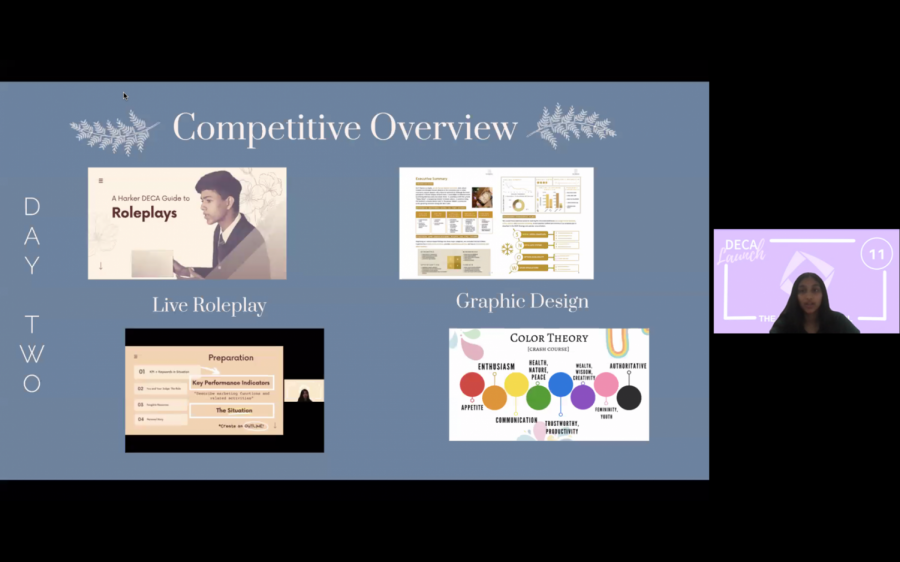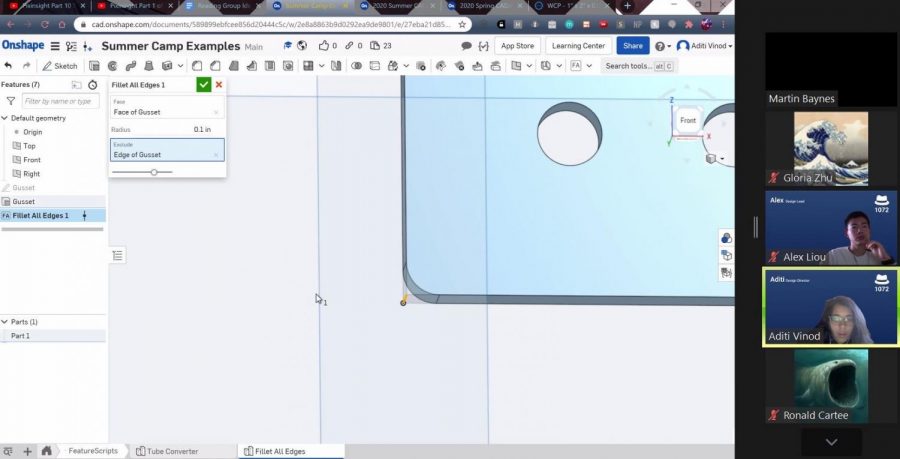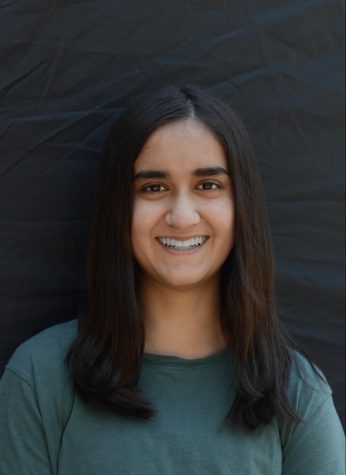Extracurricular activities and programs transition to remote learning
Provided by Anvitha Tummala (12)
Director of Roleplays Anika Muddu (10) teaches how to prepare for and present a roleplay at DECA Launch. “The conference experience was mainly something that we might be missing out [on] because the preparation for DECA can be done over Zoom or you can Facetime, but the in-conference experience is something that I don’t think we’ll get to convey to the freshmen this year,” Harker DECA CEO Lisa Barooah said. Everyone who’s ever done DECA can tell you the conferences are the most fun part.”
September 10, 2020
With the 2020-21 school year beginning remotely, both students and faculty are experiencing the changes that come with having extracurricular activities online. Many of these extracurriculars relied on in-person interaction and activities, yet each one has thought of unique ways to provide members with similar experiences.
DECA:
Normally, DECA hosts DECA Launch on the Upper School campus over a period of two days before the start of school, and they also attend four conferences throughout the year. This year, Launch was held online, featuring activities such as an Innovation Challenge and a Roleplay Tournament, two aspects from the original launch that were able to transition online. Another activity was the scavenger hunt, which became a way for students to bond and get to know each other, despite being on Zoom.
“We transitioned [the scavenger hunt] into a scavenger hunt bonding activity … One of the activities was ‘Make an origami butterfly’ and another one was ‘Have one of the people in your group pitch a household item for thirty seconds,” Lisa Barooah (12), one of the DECA CEOs, said.
Another key aspect of DECA is the conferences. The national DECA organization has not yet provided any information on all conferences this year, but Harker DECA is making conference plans for the first semester as if they will be held virtually. According to the DECA conferences page, the Western Region Leadership Conference will be held virtually from November 9 to November 13 of 2020, and the Ultimate DECA Power Trip will be held virtually from November 13 to November 15 of 2020.
“The conference experience was mainly something that we might be missing out [on] because the preparation for DECA can be done over Zoom or you can Facetime, but the in-conference experience is something that I don’t think we’ll get to convey to the freshmen this year,” Lisa said. Everyone who’s ever done DECA can tell you the conferences are the most fun part.”
Community Service:
From volunteering at a museum to helping convert books into audio files, providing blind people with a chance to read, there are various opportunities to volunteer virtually this year. Even though community service is not required this year, many students have chosen to continue their involvement, both in-person and virtually.
“I’m super excited to see that a lot of people are still doing community service even though this year, the hours have been waived due to COVID-19. It hasn’t slowed people down one bit,” Director of Upper School Community Service Kerry Enzensperger said. “That shows that the Harker community really cares, and community service isn’t just about getting hours for graduation.”
While the experience is not the same, Enzensperger recognizes the benefits of virtual volunteering.
“There is value being in-person at a volunteer site because you connect with people and the environment and animals and whatever you’re volunteering with when you’re there in-person, but it’s nice that there are still opportunities, ” Enzensperger said. “Yes, things have changed, but I think people are still making positive strides in the right direction to continue wanting to do community service and help others.”
Speech and Debate:
Before remote learning, speech and debate involved traveling around the country for tournaments. Almost all of the tournaments will be held virtually this year, but the travel experience is gone, and bonding with students has become more difficult.
“Sometimes, you don’t have to say anything to anyone to understand that they understand you,” upper school Speech and Debate teacher Scott Odekirk said. “If you’ve been sitting in a big giant classroom with a bunch of your teammates at the Berkeley tournament, waiting to see if a pairing comes out, you can just be together and understand that you’re sharing an experience with people, [and] that is lost.”
Even though significant aspects have changed, the Speech and Debate program has found ways to use online learning as an advantage.
“We have an incredible array of alumni and assistant coaches who were spread out around the country, that now we can get involved in a practice round, they can judge a practice round, they can help us refine a concept in class or outside of class, and they can lend their experience in speech and debate to conversations that motivate, inspire, and clarify things for kids,” Odekirk said. “In a lot of ways, there’s some new stuff that we’re able to do that actually improves the creative environment and the preparation process because we’re able to incorporate people that would’ve never had an opportunity before.”
Robotics:
Robotics, another program that relied on in-person interaction, has had to adapt. They are unsure about what will happen to the season, which begins in January.
“If we can’t get back, we know that there isn’t going to be a robot built, so if we are told that there’s no chance of coming back, then we will probably turn our attention to doing something else somewhat robotics-related, but not building a robot,” Arthur Jakobsson (12), technical president, said. “Apart from that, we’re just waiting for both the Robotics League and Harker to tell us if things are happening this year.”
Robotics also hosted a virtual summer camp to raise interest among students, and they are planning to do software and design training remotely during the off-season. Mechanical and electrical training are hard to do remotely.
“[The uncertainty is] a bit unnerving,” Arthur said. “I wish we’d learn more, but of course, as long as it’s safe for people, getting the message about when things are getting back to normal; later rather than too early is better, so while I hope it does change, I’m okay with it.”
Red Cross Club:
Red Cross Club is adapting as well, and they have been communicating with the Silicon Valley Red Cross Chapter. Most activities can be held over Zoom, but fundraising, one of the key parts of the club, cannot be. Since club members can no longer sell in-person, they are informing people about causes to support on social media and requesting for people to donate on the official website for the Red Cross. They also usually host an annual blood drive, but these plans will be affected as well.
“We are planning to still have the blood drive in-person, and based on how we’re doing second semester, we would coordinate the logistics for how people can get to school and make sure that everything is safe to still have them donate blood,” Suman Mohanty (12), co-president of Red Cross Club, said.
With club events and activities online, it can be difficult to provide students with the same experience they would have had if school were in-person.
“As a leader right now, my biggest concern is to make sure that I can present the students who are in the club with opportunities like I was when I was a club member, because I want to make sure that everyone has all of the different opportunities to engage and help their community,” Suman said. “Now more than ever, there are opportunities to help the community, because a lot of people are facing struggles right now.”
Medical Club:
Medical Club, a club that is well-known for its annual Evening of Medicine event, is transitioning their speaker and diagnosis events online, and they are also considering plans for a virtual Evening of Medicine. Last year, the event featured a keynote speaker, booths and a panel of physicians. These elements can also be transitioned online, but they may use virtual tools as well this year.
“What we’re planning to do is have a trivia, have ethics booths and then also use online resources,” Suman, president of Medical Club, said. “For example, there’s a surgery simulator, so [we will] maybe have a live dissection that is streamed or have a surgery simulator used in the booth.”
Make a Birthday Wish:
Make a Birthday Wish club centers around throwing birthday parties for children who live in low-income housing. Even though their plans to attend the birthday parties have been affected, their overall mission remains the same. This summer, they brought masks to the families to help them during the ongoing COVID-19 pandemic, as they focus on helping people and bringing them comfort.
“One of our goals this year is that if virtual parties are not feasible, we want to either send over some activities or even just kits so they could be having their own birthday parties, because it still means a lot to us that they’re having that same experience,” Minali Kapadia (11), president of Make a Birthday Wish, said.
Losing the experience of attending the birthday parties has had a significant impact upon members of the club as well.
“One of the main things about Make a Birthday Wish that attracted new people and was also really beneficial to the kids was us actually being able to go there,” Minali said. “We can send over the materials and provide this experience for them, but I think that as much as we’re benefiting them by throwing them a birthday party, they’re also benefiting us by giving us that interaction, that experience. Forming connections with them is something that I think all of us really value.”




![LALC Vice President of External Affairs Raeanne Li (11) explains the International Phonetic Alphabet to attendees. "We decided to have more fun topics this year instead of just talking about the same things every year so our older members can also [enjoy],” Raeanne said.](https://harkeraquila.com/wp-content/uploads/2025/10/DSC_4627-1200x795.jpg)


















![“[Building nerf blasters] became this outlet of creativity for me that hasn't been matched by anything else. The process [of] making a build complete to your desire is such a painstakingly difficult process, but I've had to learn from [the skills needed from] soldering to proper painting. There's so many different options for everything, if you think about it, it exists. The best part is [that] if it doesn't exist, you can build it yourself," Ishaan Parate said.](https://harkeraquila.com/wp-content/uploads/2022/08/DSC_8149-900x604.jpg)




![“When I came into high school, I was ready to be a follower. But DECA was a game changer for me. It helped me overcome my fear of public speaking, and it's played such a major role in who I've become today. To be able to successfully lead a chapter of 150 students, an officer team and be one of the upperclassmen I once really admired is something I'm [really] proud of,” Anvitha Tummala ('21) said.](https://harkeraquila.com/wp-content/uploads/2021/07/Screen-Shot-2021-07-25-at-9.50.05-AM-900x594.png)







![“I think getting up in the morning and having a sense of purpose [is exciting]. I think without a certain amount of drive, life is kind of obsolete and mundane, and I think having that every single day is what makes each day unique and kind of makes life exciting,” Neymika Jain (12) said.](https://harkeraquila.com/wp-content/uploads/2017/06/Screen-Shot-2017-06-03-at-4.54.16-PM.png)








![“My slogan is ‘slow feet, don’t eat, and I’m hungry.’ You need to run fast to get where you are–you aren't going to get those championships if you aren't fast,” Angel Cervantes (12) said. “I want to do well in school on my tests and in track and win championships for my team. I live by that, [and] I can do that anywhere: in the classroom or on the field.”](https://harkeraquila.com/wp-content/uploads/2018/06/DSC5146-900x601.jpg)
![“[Volleyball has] taught me how to fall correctly, and another thing it taught is that you don’t have to be the best at something to be good at it. If you just hit the ball in a smart way, then it still scores points and you’re good at it. You could be a background player and still make a much bigger impact on the team than you would think,” Anya Gert (’20) said.](https://harkeraquila.com/wp-content/uploads/2020/06/AnnaGert_JinTuan_HoHPhotoEdited-600x900.jpeg)

![“I'm not nearly there yet, but [my confidence has] definitely been getting better since I was pretty shy and timid coming into Harker my freshman year. I know that there's a lot of people that are really confident in what they do, and I really admire them. Everyone's so driven and that has really pushed me to kind of try to find my own place in high school and be more confident,” Alyssa Huang (’20) said.](https://harkeraquila.com/wp-content/uploads/2020/06/AlyssaHuang_EmilyChen_HoHPhoto-900x749.jpeg)



![Director of Roleplays Anika Muddu (10) teaches how to prepare for and present a roleplay at DECA Launch. “The conference experience was mainly something that we might be missing out [on] because the preparation for DECA can be done over Zoom or you can Facetime, but the in-conference experience is something that I don’t think we’ll get to convey to the freshmen this year,” Harker DECA CEO Lisa Barooah said. Everyone who’s ever done DECA can tell you the conferences are the most fun part.”](https://harkeraquila.com/wp-content/uploads/2020/09/image5-900x562.png)







